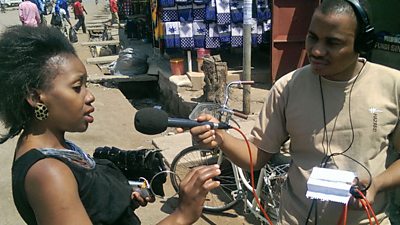Downloads
Publication date: June 2017
Context
At the project’s outset in 2013, Tanzanians were scheduled to go to the polls for three important political milestones: a constitutional referendum, local elections in 2014, and a general election in 2015. A surge in the country’s youth population meant that Tanzanians under 19 accounted for more than half of the population (57%) and were, therefore, positioned to play an important role in deciding the outcome of all three events. However, a dramatic decline in voter turnout between the 2000 and 2010 elections suggested that Tanzanian youth were not exercising their constitutional rights.
The project
In this context, and with funding from the Swiss Agency for Development Cooperation, ����ý Media Action launched the Niambie project in 2013. Designed to encourage young Tanzanians (particularly women) to engage in civic and political processes, the project incorporated two key outputs: a weekly national radio show supported by social media platforms; and capacity-strengthening initiatives for three media houses in the country.
Research approach
����ý Media Action carried out nationally representative surveys of 1,993 Tanzanian youth in 2014 (baseline) and of 6,170 Tanzanian youth in 2016 (endline) to evaluate the extent to which the project achieved its objectives. It conducted regression analysis to compare key outcomes (such as knowledge of political issues) between those exposed and unexposed to the radio programme, while controlling for various factors – confounders – that might have affected the results (such as age, education levels, income or interest in politics).
����ý Media Action also used structural equation modelling (SEM) to understand the pathway through which change occurred, and carried out qualitative research to understand how and why change occurred.
Key findings
Reaching both men and women
- 3.8 million Tanzanian youth (24% of the population aged 15-35) reported listening to Niambie. 51% of all listeners were women
Increasing knowledge of political processes
- 81% of listeners said that Niambie had improved their understanding of: their rights and responsibilities, the constitutional review process, the local elections and the general election
- Compared with non-listeners, young people who tuned into Niambie were significantly more likely to be knowledgeable about political and current affairs, even after controlling for confounders
Encouraging discussion
- Although discussion decreased slightly among young Tanzanians over the course of the project (85% reported discussing politics frequently or occasionally at baseline compared with 79% reporting the same at endline), after controlling for confounders Niambie listeners were found to be nearly three times as likely as non-listeners to discuss political processes with others
Increasing political participation
- Those tuning into Niambie were more than twice as likely as non-listeners to engage in some form of political action (such as volunteering for a political party, or attending a local government meeting). Nonetheless, youth participation levels remained similar at baseline and endline, with 47% reporting having taken at least one action in both surveys
- Despite being more engaged in politics, Niambie listeners did not feel more confident that they would influence decision-making. This should be understood in a context of a changing political climate and the introduction of laws that restrict freedom of expression
Engaging young women
- Niambie achieved a similar impact on knowledge, discussion, and participation among men and women. These results are particularly positive given the challenges other governance programmes in Tanzania have faced in engaging and empowering female audiences.
- The production team made a concerted effort to engage female audiences – Niambie had a male and female presenter, and women were represented in the programme both as guests and via vox-pops.
Pathways to change
- SEM results suggest that Niambie impacted audiences’ political participation directly and indirectly (via increased discussion, which also drove knowledge and, ultimately, participation)
Strengthening governance programming
- Audiences felt the capacity- strengthening initiatives with media houses had improved the accuracy and balance of partner stations’ elections coverage
Implications
Niambie had a largely positive impact on young men and women’s civic engagement. However, Tanzanian youth remain uncertain that they can influence governance issues in the current political environment. This suggests that the need for spaces for discussion, like Niambie, is as important now as it was at the outset of the project.
That Niambie indirectly influenced political participation by encouraging discussion is consistent with findings from Kenya. It thus reinforces the value that ����ý Media Action places on modelling discussion in its governance programming and on creating spaces for young people to engage in open dialogue about governance issues.
Search by Tag:
- Tagged with Niambie Niambie
